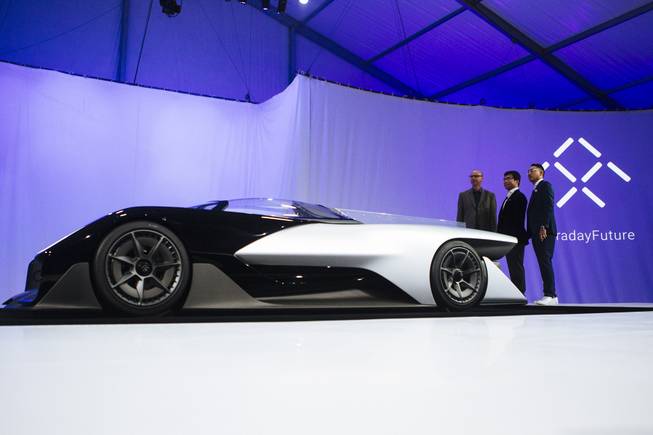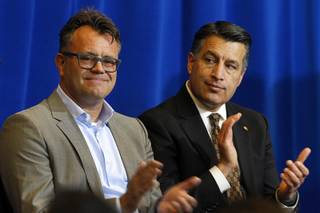
Nick Sampson, Ding Lei, and Richard Kim unveil Faraday Future’s concept vehicle FFZERO1 at an event before the start of the Consumer Electronics Show on Monday, Jan. 4, 2016, in a parking lot across the street from the Luxor.
Friday, Jan. 22, 2016 | 3:25 p.m.
More Coverage
The Governor’s Board of Economic Development today approved giving $215.9 million in tax incentives for electric car company Faraday Future, which plans to open its first manufacturing plant in North Las Vegas.
The expected move was the culmination of a series of events needed to bring the company’s manufacturing plant to North Las Vegas’s 18,000-acre Apex Industrial Park, which has remained relatively vacant for decades. In December, Gov. Brian Sandoval called a special session of the Nevada Legislature to create a new tax incentive structure required to seal the deal with Faraday.
California-based Faraday had considered building its first manufacturing plant in Georgia, Louisiana or California, but those tax incentives and a workforce development program created by the Legislature were crucial in its final decision to come to Nevada.
“It’s my belief that this is a transformative project on many levels,” Sandoval said. “A project like this comes along once in a generation.”
As expected, Faraday requested and was approved for the full amount of allowed abatements and tax credits created under the incentive structure, passed as SB-1.
Under that package, a business that invests a billion dollars over 10 years into the state can apply for full sales tax abatements for 15 years as well as partial real and personal property tax and modified business tax abatements for 10 years. They can also apply for transferable tax credits of $9,500 for each permanent, full-time job created, up to $4,000.
The board did not approve implementing the new workforce development program for Faraday because the details of that program have not been worked out yet. Still, several board members praised the program.
“It’s a unique aspect, a unique relationship between Faraday and the state,” said Lt. Gov. Mark Hutchison. “It really provides another opportunity for us in the future to do workforce development.”
Though much of the meeting was spent rehashing the details of the legislation passed in December, Faraday’s application reveals new details about expected job creation and benefits, economic impact and the company’s timeline for development.
Faraday is expected to break ground by the end of January and expects to finish building somewhere in the second half of 2017. Faraday’s initial capital investment at the site is projected at $1.4 billion, including $26 million for 938 acres of land, $612 million to build its 3.4 million square foot facility and $737 million in equipment.
At peak capacity, the facility will turn out 150,000 cars each year. Over the next twelve months, Faraday plans to hire 50 workers here and incrementally expand its staff each year.
By 2023, the team will comprise 4,500 staff members, including 173 making $80,000 per year and 4,327 making $44,444. Fifty percent of those positions must be filled by Nevadans.
Over 20 years, the project is projected to funnel $277 million into local government, $259 million into the school district and $229 million to the state. Faraday also promised to make a direct contribution of $1 million to K-12 education in the state for six years starting in the 2018-2019 school year.
The board also granted the office’s director Steve Hill to take other necessary actions, like negotiating and executing reimbursement agreements for infrastructure projects out at the Apex site and issuing certificates to Faraday Future for the asked abatements and tax credits.
In a report to the board, Hill noted another recent win for the state out at Apex. Hyperloop Technologies has begun construction on its open air test facility at the site, which had been announced in December shortly before the details of the Faraday deal were made public.
“I think this is emblematic of the fact that we’re not talking about being the ‘New Nevada’ but we are the ‘New Nevada,’” Hill said. “In helping to bring Hyperloop to Nevada, we flew UAV flights over Apex and shipped that information to Hyperloop digitally to plan out their test track. It’s a lot of fun to see what we can do with this new technology. We’re not done.”


Join the Discussion:
Check this out for a full explanation of our conversion to the LiveFyre commenting system and instructions on how to sign up for an account.
Full comments policy